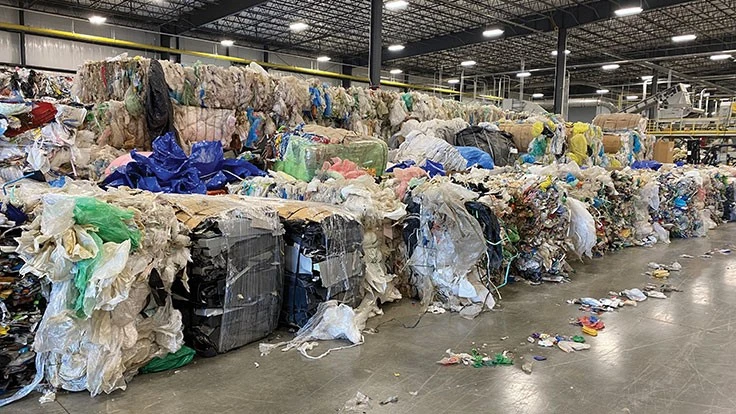
Photo courtesy of Brightmark
The City College of New York Grove School of Engineering has released a new report that concludes that advanced, or chemical, recycling helps avoid climate impacts, reduces demand for energy resources and offers key tools for expanding the circular economy. Marco J. Castaldi, Ph.D., professor of chemical engineering and director of CCNY’s Earth Engineering Center (EEC), and EEC research associate Lauren Creadore authored the report, which Matthew Kastner of the American Chemistry Council says was commissioned by that Washington-based organization. He adds, "The conclusions CCNY came to are their own."
Following their examination of 13 recently completed life cycle assessments (LCAs), most of which use projected data, the report’s authors found that advanced recycling can transform hard-to-recycle plastics into products with a smaller carbon footprint than those made from new resources. The processes also reduce energy use and greenhouse gas emissions compared with conventional end-of-life methods, such as landfilling and waste to energy. Advanced recycling contributed to circularity for plastics in all 13 LCAs, according to the report.
Specifically, Castaldi and Creadore’s research found that advanced recycling technologies yield a number of environmental benefits:
- producing plastic and chemical products with reduced global warming potential compared with products made from virgin resources;
- reducing the need for fossil energy resources by up to 97 percent compared with landfilling; and
- reducing CO2 equivalent emissions by more than 100 percent compared with typical end-of-life processes when accounting for displaced demand for chemical products and energy.
“As advanced recycling becomes increasingly efficient, it is poised to play a major role in achieving global sustainability goals,” Castaldi says in a news release about the report. “It can transform hard-to-recycle plastics into a multitude of high-value feedstocks, reducing the need for fossil resources and limiting the environmental impact of waste management. Equally important, the data suggest that our transition to a more circular economy will dramatically improve climate outcomes.”
“There’s been significant investment and interest from companies and policymakers in advanced recycling,” adds Bob Hall at the New York City-based American Society of Mechanical Engineers’ Research Committee on Energy, Environment and Waste. “Scientific studies like this one from CCNY, coupled with engineering ingenuity can help inform and responsibly move us towards a more sustainable and circular future. As these technologies mature, it is imperative to conduct additional studies on advanced recycling that adhere to international LCA standards.”
“ASME suggests that technologies that have current operating performance data and have a facility to visit should be given priority for future analyses,” says Annette Scotto, ASME Chair of the Material and Energy Recovery Division.
The report, “Quantitative Comparison of LCAs on the Current State of Advanced Recycling Technologies,” can be accessed here.
The American Chemistry Council prepared a summary of the CCNY report's findings, noting that other reports have reached similar conclusions.
Latest from Recycling Today
- Aqua Metals secures $1.5M loan, reports operational strides
- AF&PA urges veto of NY bill
- Aluminum Association includes recycling among 2025 policy priorities
- AISI applauds waterways spending bill
- Lux Research questions hydrogen’s transportation role
- Sonoco selling thermoformed, flexible packaging business to Toppan for $1.8B
- ReMA offers Superfund informational reports
- Hyster-Yale commits to US production





